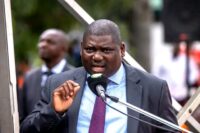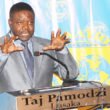ECONOMIST Chibamba Kanyama says a high level of government commitment is required to attain any support from the International Monetary Fund.
In response to a query, Kanyama said the recent meeting between IMF and the Zambian government was a step in the right direction and meant that the relationship had been restored.
“The IMF Director of African Department Abebe Aemro Selassie has indicated [that] the application by Zambia for funding will be assessed soon. This statement has been widely followed globally given Zambia’s debt situation and its recent default on a due payment to Eurobond holders. I personally know Abebe and consider him to be a down to earth and ethical Ethiopian national who is currently heading a top position at the Fund. As Head of the Department, his recommendations on Zambia will certainly carry a lot of weight within the IMF ranks. However, his assurance to assess the request is no guarantee of a favourable outcome,” Kanyama said.
“There are a lot of layers within the governance system of the IMF that are involved in programme approvals. Key departments within the Fund will make their own assessments according to set evaluation benchmarks. Whatever the case, there is one positive at this stage: The IMF Director for African Department personally made a visit to Lusaka, barely a month after appointing Preya Sharma as Resident Representative, replacing Alfredo Baildini who was recalled in July 2018. Given the small size of the delegation and number of days spent, it is also clear [that] the visit was an installation mission of the New Mission Chief for Zambia Alex Segura-Ubiego and Sharma as Resident Representative (Mission Chiefs generally install Resident Representatives). The real takeaway, therefore, is that the Zambia-IMF relationship has been restored and at a time when the creditors desperately looked forward to this initial step!”
Kanyama said he was confident that the IMF was serious about supporting Zambia.
“I am very positive the IMF is serious about supporting Zambia. It has in the past months keenly followed the events about Zambia and, as expected of the IMF, its assessment is in part due to possible spillover effects if Zambia’s appeal for help does not receive serious attention. The IMF first received a serious request for support from Zambia in May meaning all earlier pronouncements by government that it had approached the IMF may just have been intentions,” Kanyama said.
“The prospects for a Fund program are summed up in one sentence taken from Abebe’s end of Mission Statement, ‘We look forward to the presentation of the government’s home-grown economic strategy, and will be assessing in the coming weeks how the IMF could support the authorities’ reform efforts through a possible Fund program’. I am not very sure I have full details of what the home-grown economic recovery strategy is but I know that in September this year, government approved the Economic Recovery Plan (ERP) whose focus is a move toward economic stabilization; push towards economic recovery and a growth plan aimed at restoring macroeconomic stability and debt sustainability while diversifying the economy. This seems to be the Zambia Plus that is yet to deliver on fiscal consolidation.”
Kanyama added that government needed to show serious commitment to attaining the benchmarks set by the IMF.
”The key issue is the level of government commitment required to attain these benchmarks in order to get the IMF support. Does government possess enough courage to embark on serious stabilization measures just before the 2021 elections given that some of the expectations involve halting infrastructural projects, stopping borrowing, and spending prudently? Or could it be government hopes to secure the program now, negotiate for part financial injection but implement a full program after the elections? If the IMF buys into the latter, it would be a wise move but requiring commitment from all political players given the uncertainty of elections,” said Kanyama.
”The IMF team met President Edgar Lungu and probably this gives an indication there is executive commitment to implement what the IMF is looking for. I am personally lobbying for IMF support towards Zambia because the results will eventually be good to every citizen. It is for this reason I support any kind of commitment that government will make in ensuring we get the IMF on board. My advice to government would be for us to go for a big new medium-term expenditure framework that will change the outlook materially and we can be on a happy road to recovery! The ball is in Zambia’s court.”












